Did you see the new thank-you ticker crawling across the screen at this year’s Oscars? The long list of names reminded me that whether we are actors or teachers, directors or principals, we didn’t get where we are without the help of a lot of people. I was reminded of all the people who have contributed to my own, albeit less glamorous, career in education.
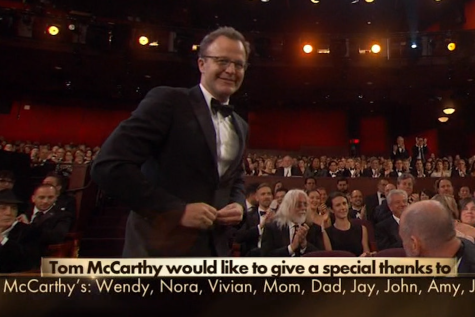
I was reminded that I have not become the teacher I am today without the help, encouragement, mentoring, and resources of others. And I was reminded that too many teachers don’t get what they need to support their growth as effective educators.
Teaching can be an isolating profession: we spend most of our time with students and have few opportunities to work with and learn from our peers. Social media has changed that in big ways, but when I started teaching, the internet was barely a blip on the paper in my typewriter. So who helped me develop my teaching skills? Who made a difference in my growth as an educator? Which names would run across my thank-you ticker?

Maybe a better question is: what do teachers need if they are to become great teachers? After 25 years in the classroom, I’ve got a longer-than-Oscar-speech ticker of gratitude, starting with:
Effective master teachers: prior to student teaching, I observed a couple master teachers in action: Joan Price and Mary Jackson welcomed me into their high school classrooms, allowed me to work with their students, and gave me valuable insights that got me started on my teacher training. When I was placed in two classrooms for my student teaching, I struck gold with junior high master teacher Carol Treu and high school master teacher Ana Byerly. Learning at the feet of these excellent teachers told me that I really had no excuse for not becoming a great teacher! But as outstanding as they were, I needed more help once I took charge of my very own classroom as a full time teacher. Then I needed:
Supportive administrators: once again, I struck gold when I landed my first job at Altimira Middle School under the leadership of Dr. Marilyn Kelly. Typical of most new teachers, I couldn’t even imagine all that I didn’t know. As enthusiastic and educated as I was, and even as successful I’d been in my student teaching, I was woefully unprepared for the demands of full time teaching in a middle school classroom.

Fortunately for me, my boss saw my panic as well as my potential, and she made time to meet with me, coach me, and further the training that all teachers need when they first enter a classroom. I shudder to think what would have become of me (and my students) without Marilyn’s support. But years later, after I developed some good strategies and felt pretty confident about my work, I wanted to keep growing and learning and strengthening my skills, so I needed:
Ongoing support and effective professional development: just because we become effective teachers doesn’t mean we no longer need our administrators’ support. In fact, that support can be the difference between a teacher stagnating or even declining in effectiveness vs. growing into a teacher who impacts not just his/her students but also other teachers and the profession. Even after I left Altimira and Marilyn retired, she continued to be a mentor to me, encouraging me to pursue powerful professional development, such as National Board Certification and a master’s degree. When I finally carved out the time to do both, I benefited from the support of principals Dave Rose and Emily Dunnagan, who assisted me in the process, excused me from meetings when I had classes, honored my commitment to my growth, and celebrated with me when I finished.

I can still see Dave, following me around my classroom with a video camera, taking time out of his busy schedule to film my students for my National Board portfolio. And Emily contributed to my video application for Google Teacher Academy, another example of the kind of paradigm-changing professional development that has greatly impacted my work. Dr. Jessica Parker, my advisor in my M.A. program, has been a significant mentor whose work has had a tremendous influence on my classroom.
Other valuable professional development I have had include the Bay Area Writing Project Summer Institute (thank you, Greta Vollmer!) and conferences such as CUE, ISTE and NCTE. I have been lucky to have administrators who support my need to choose the professional development that benefits my teaching the most. Quality professional development and support from administration is critical, but teachers also need:
Autonomy to choose, revise, and deliver curriculum: after just one year of teaching, I read Nancie Atwell‘s groundbreaking book In the Middle, which introduced me to the writing workshop model. I met with Marilyn (my principal at the time) to ask if I could try this approach in the fall. There I was, a brand-new-sometimes-still-struggling teacher, asking to experiment with a pretty radical method for writing instruction. And Marilyn said yes. But more than that, she asked about the details: how would I handle assessment? accountability? parent concerns? And then she checked in with me throughout the year to see how it was going. She let me take charge of my classroom, but she didn’t walk away.
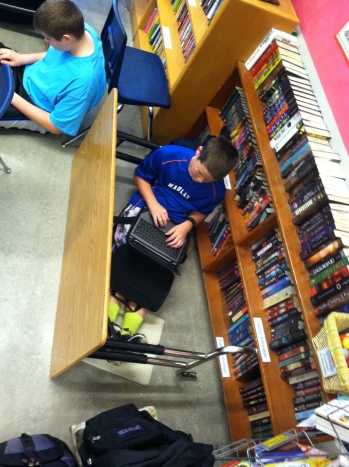
I’ve been the lucky recipient of this kind of admin. support in recent years, too. I still remember that September day in 2011 when I sat down with my then-principal, Emily Dunnagan, to propose that my 8th graders participate in NaNoWriMo, which meant I would be challenging them to write a novel in a month. She didn’t even hesitate; I still remember her exact words: “I love it! They would be writing every day! This is great!” And then, when we dove into NaNoWriMo for the first time, Emily joined my students on the journey. She brought her laptop to my classroom and wrote with the students; she competed with them in word counts on the Young Writers Program website; and she threw a pizza celebration for all the winners when it was all over.
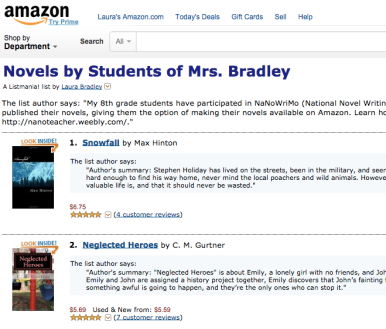
Emily can take a great deal of credit for my students’ enthusiastic participation in NaNoWriMo and their resulting growth in writing skills. But my students would not have loved writing their novels if they didn’t have laptops, which means teachers need:
Resources: when I decided that my students needed laptops in our classroom (instead of trying to book our school’s one, shared computer lab), I turned to Petaluma Educational Foundation, a local non-profit that has been raising money for our schools since 1982. They awarded us with a $15,000 grant, which gave my students a half-set of laptops for classroom use. That was enough to get my students off and running with their novels, and the following year, PEF granted us another $15,000 to complete our classroom set. Those laptops brought about the single, most significant change in my curriculum and teaching, a change that only came about because of the resources available from PEF.
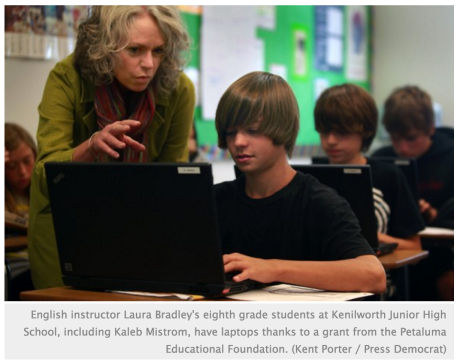
I’ve since received a grant for a weather system on our campus that allows our students to use real-time weather data from our site as well as sites across the country to learn about the science of weather (thank you, PEF); a smaller grant for a 3D printer for our Maker Space (thank you, Donors Choose); and two more grants for technology upgrades for our KTV broadcast media program (thank you, PEF and Educator Innovator). Grant writing is time-consuming and difficult, but well worth the efforts when one discovers the wealth of resources available to teachers. But we can still find ourselves alone in our classroom, facing the day-to-day demands of teaching on our own. How can we take advantage of the wisdom, expertise, and support of our colleagues? Teachers also need:
Collaboration time: a teacher’s day is jam-picked with in-my-face-need-it-now demands. There is never an opportunity to close my door, put my head down on my desk, and ask my non-existent secretary to cancel my afternoon appointments so I can meet with another teacher. The kids are there, every day, and I need to be with them. But sometimes our best resources are the teachers right next door to us, doing amazing things in their classrooms, yet the traditional school schedule doesn’t give us opportunities to collaborate with them. It wasn’t until I was asked to partner with colleague Isaac Raya on our school’s daily news show that I discovered the power of ongoing collaboration. Isaac and I didn’t teach together and we didn’t have much time to collaborate, but we started meeting each morning in our TV studio (along with five or six students) to broadcast our live news show. That 20 minute collaboration before school every day continued for three years, and we nurtured our little news show into a pretty professional student-run production. This year our KTV club has become an official class: two sections of broadcast media where students produce all the content and work every job of a professional news show, and we’ve added a third teacher to our digital media collaboration.
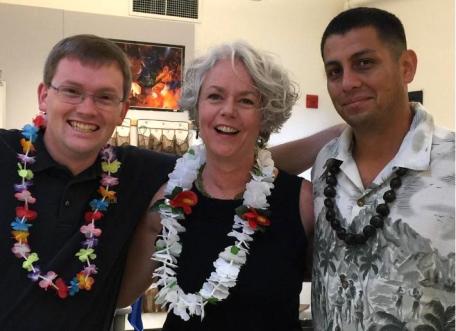
Isaac and I continue to collaborate on our KTV program, although without the daily face-to-face time. Much of our collaboration takes place via email, Twitter, and our class website. And our program is better because of our collaboration. How much better would all of our classes be if we had more opportunities to collaborate?
I’ve already broken the rule to keep-blog-posts-short-and-pithy, but maybe that makes my point: for teachers to be successful, we need a lot from the people in our schools, as well as from the greater community around us. It is a big and complex job to support teachers and give them resources to be successful. But if we want our students to succeed, shouldn’t we be investing all we can in their teachers?
What names would run across the screen during your Oscar speech? How did you become the teacher you are today?


Superb! Yes, I’d love to be there for dinner and skyping Tues.
Sent from my iPad
>
Hi Laura
Nice tribute to those professionals who impacted your life! I am proud to have been part of the group. My thought now is how, in the future, your students will pay tribute to you. You are one outstanding teacher/professional!
Marilyn Kelly
Excellent! Another freakin’ FANTASTIC post. Read of course by your number 1 FANtastic person 🙂
Ha ha! Thanks so much, Nathalie!